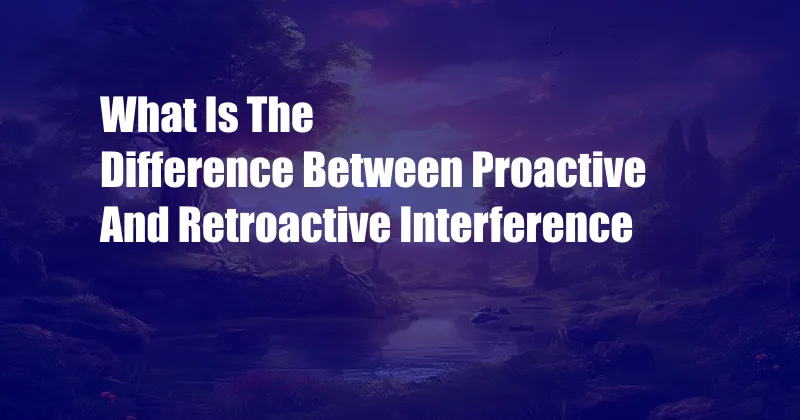
**Proactive vs. Retroactive Interference: Unraveling the Impact of Memory Distortions**
Have you ever struggled to remember a fact you once knew but now seems to have vanished from your memory? This phenomenon, known as forgetting, is influenced by various factors, including interference. Interference refers to the disruption of storing or retrieving information due to the presence of other similar or conflicting information.
Two distinct types of interference exist: proactive interference and retroactive interference. Understanding their differences can help us grasp the intricacies of memory processes and devise effective learning strategies.
Proactive Interference
Proactive interference occurs when previously learned information hinders the acquisition or retrieval of new information. For instance, if you learn French after studying Spanish, you may encounter difficulty recalling French words because the Spanish vocabulary interferes with the encoding of new French words.
This interference arises because the brain tends to associate similar concepts and experiences. When encountering new information, it may automatically retrieve previously stored related information, leading to confusion and memory errors. The stronger the connection between the old and new information, the more pronounced the proactive interference.
Retroactive Interference
Retroactive interference occurs when newly acquired information disrupts the recall or retention of previously learned information. Continuing the earlier example, if you learn Portuguese after studying French, you may find it harder to remember French vocabulary as the newly encoded Portuguese words interfere with the retrieval of French.
Retroactive interference is often attributed to the limited capacity of working memory. When new information enters, it competes with existing memories for attention and resources. If the new information is highly relevant or salient, it may displace or overwrite the older memories, resulting in forgetting.
Memory Strength and Interference
The strength of memories plays a crucial role in the extent of interference. Well-established memories are less susceptible to interference than weaker ones. This is because stronger memories have stronger neural connections and are more easily accessible.
Spaced repetition, a learning technique that involves reviewing information at increasing intervals, can help strengthen memories and reduce the effects of interference. By revisiting information over time, it is repeatedly reactivated and reinforced, increasing its resistance to forgetting.
Practical Implications
Understanding proactive and retroactive interference can guide effective learning practices. To minimize interference, it is advisable to:
- Study similar subjects at different times to reduce the likelihood of overlap and confusion.
- Review and revisit learned material regularly to strengthen memories and prevent decay.
- Use mnemonic devices, such as flashcards or visual aids, to create unique associations and facilitate recall.
FAQs
Q: Can proactive and retroactive interference both occur simultaneously?
A: Yes, both types of interference can coincide, although one type may be more dominant than the other.
Q: How can I distinguish between proactive and retroactive interference?
A: Proactive interference affects the acquisition or retrieval of new information due to prior knowledge, while retroactive interference affects the recall or retention of previously learned information due to new information.
Q: Is there a way to eliminate interference entirely?
A: While interference cannot be completely eliminated, it can be minimized through effective learning strategies, such as spaced repetition and avoiding overload.
**Conclusion: Embracing the Dance of Memories**
Proactive and retroactive interference are integral aspects of memory, shaping our ability to learn and recall information. By understanding their dynamics, we can optimize our learning and minimize the effects of forgetting. Memory is not a static entity; it is a dynamic interplay of events, with new experiences constantly reshaping the landscape of our minds. Embracing this fluidity allows us to navigate the intricacies of memory and unlock our full cognitive potential.
Are you interested in delving deeper into the fascinating world of memory? If so, I encourage you to explore further resources and engage in discussions on this topic. Your curiosity and willingness to learn will continue to expand your understanding and empower you as a lifelong learner.